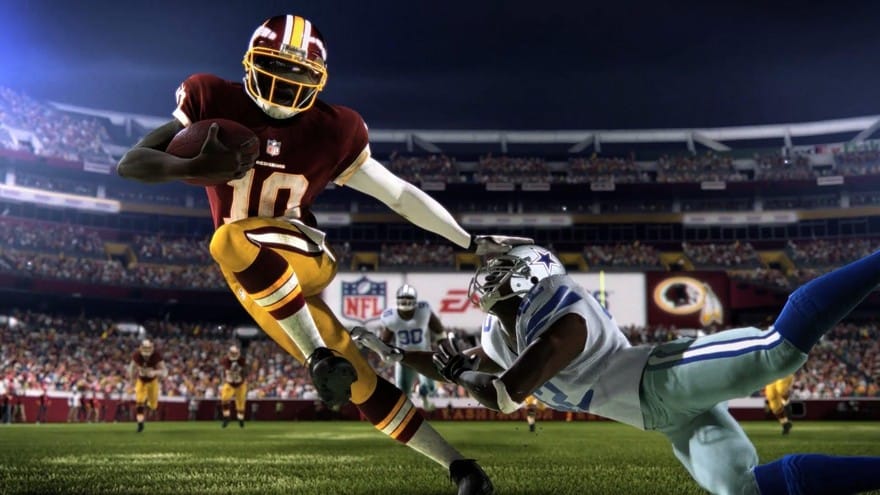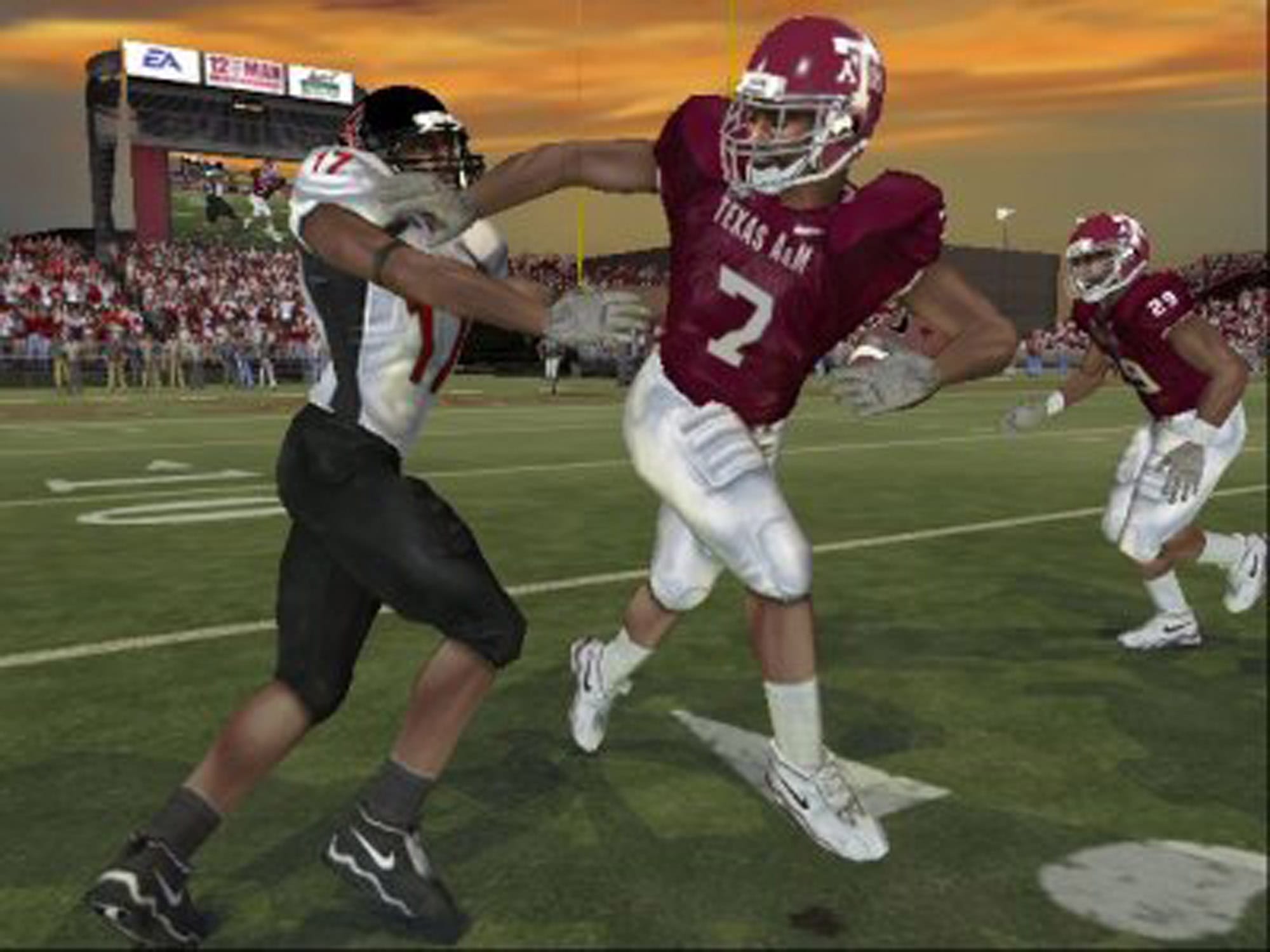The NFL is awful. Here’s how Madden could help

I find myself conflicted with my feelings about the NFL these days—and, by proxy, Madden. Maybe it’s that I grow more socially conscious as I get older, and can no longer ignore the circus of controversies surrounding professional football, but I have come to find the NFL troublesome and Madden has something to do with it.
The issues of the NFL have ran deep over the last few years. You can trace issues of player misconduct all the way back to Michael Vick’s infamous dog-fighting troubles, Ray Lewis’ murder trial, or Ben Roethlisberger’s suspension when he was accused of sexual assault. But when you discuss player controversy these days, the conversation will more likely revolve around Ray Rice’s assault of his fiancee, which resulted in him being cut by the Baltimore Ravens and turned into a league pariah, or Adrian Peterson’s year-long suspension after being indicted for child abuse. But league troubles also extend beyond player conduct and tilt into corporate cover-ups and negligence. The NFL recently settled a $765 million lawsuit with players regarding the league’s mishandling of player concussions which led to CTE.
The venerable Madden series of games is a promotional tool for the NFL. But it is about as faithful to football as Call of Duty is to war. The game simulates all of the glory while ignoring the more troubling issues which surround the league. Madden is a place where we run to escape the moral conundrums which plague professional football both on and off the field. The game returns football to a purer game, a game which no longer exists. Madden’s ignorance of the NFL’s troubles is a misguided attempt to assure football fans that everything is fine.

In reality, fans rarely see a season of football pass without incident. Since 2007, eight players have been indefinitely suspended or outright cut from their teams due to their conduct on and off the field. These aren’t insignificant players either—of the 69 players suspended for reasons other than substance abuse since 2007, 18 were played in the Pro Bowl (the NFL’s All-Star game).
It seems like a problem that has nothing to do with a videogame. Madden can’t fix issues of abuse and player conduct. But as the NFL’s promotional tool it can reach out to an audience of NFL fans and make them view these complex issues from alternative angles. Instead of ignoring the problems, Madden can ask their players to think constructively about their own issues regarding player discipline.
a misguided attempt to assure football fans that everything is fine
There is a precedent for this. NCAA Football, a now-discontinued series also created by EA, dealt with similar issues in its 2005 and 2006 iterations. To anyone who follows college athletics, it’s no secret that the NCAA has constantly dealt with issues regarding student conduct. Recruiting scandals and the threats of academic probation are as much a part of college football as mascots and school fight songs. Not only does the NCAA have to police players but also administrations who ignore violations and student academics.
The NCAA Football videogame didn’t ignore these issues, but put players of the game in charge of policing their in-game schools. As the season progressed, players would get pop-up screens letting them know if their students were failing academic standards or had violated team rules. You, the coach of the team, were responsible for disciplining the student-athletes and suspending them appropriately. This forced players of the game to think constructively about how they viewed NCAA rules which are so often hotly debated. If players were too lax in handling these issues the NCAA could step in and put your school on academic probation, costing you bowl games and scholarships.
This might seem minor, but it was a statement from the NCAA to the people playing their game. It sent the message that the NCAA understood these college students weren’t perfect people and their fans should know that too, but when situations arose there was a plan in place for schools and the NCAA would handle these infractions. They took it a step further by having the people who played the game make these disciplinary decisions for themselves.

Fans who would scoff at school administrations who suspended players or would argue that a member of the Texas Longhorns was only there to play football anyways suddenly had to confront that idealism first-hand. It also reinforced the idea that it didn’t matter if your five-star recruit was the greatest thing to happen to college sports. If they couldn’t keep out of trouble they weren’t going to help your school. Players who were good off the field were as important as players who were good on the field.
The Madden series dipped its toes in this territory with Madden 06. On rare occasions, star players would skip training camp to go shoot a movie (something which to my knowledge has never actually happened in the NFL). When this happened you, as the team owner, would have to decide how to take disciplinary action. The idea wasn’t well realized as it had no real effect on your team. There was no easy way to suspend a player for multiple games and refusing to take action didn’t affect your franchise in anyway. While the NCAA loomed in the background of it’s football threatening to punish ignorance of player misconduct, Madden’s mechanics weren’t designed to punish players.
Forcing players to make the hard choice regarding star athletes offers a simple, yet interesting opportunity for fans to engage in the hard questions which surround the NFL. It allows them to initiate a conversation the league seems hell-bent on ignoring. Players would have to decide whether or not to play controversial players awaiting discipline from the NFL, they would have to make the hard decisions about signing players coming off of suspensions. In many ways the decisions made by owners and GMs regarding suspended players is more nuanced and gray than those of an NCAA coach. Signing a player like Michael Vick was a gamble given the baggage that came with his signing. Suddenly Eagle training camp wasn’t about Super Bowl aspirations, the media only wanted to know about the team’s new back-up Quarterback. Adrian Peterson wasn’t suspended by the Vikings until corporate sponsors threatened the organization.
You, the coach of the team, were responsible for disciplining the student-athletes
There are other ways to explore player behavior in Madden. Instead of only focusing on the negative, Madden could use this same mechanic to focus on the positive aspects of NFL players. The game could highlight players who are also good people. Analysts and sportswriters often talk about “quality players,” athletes who are positive role models on and off the field—why not make this a part of each player’s personality?
One way this could play it is to make the attitude of a player a desirable stat. One of the most common modern sports narratives is taking on a troubled athlete at the cost dealing with their baggage. The Minnesota Vikings spent years dealing with the risk-reward of Randy Moss. Adam “PacMan” Jones was bounced from a few NFL teams because of his poisonous attitude in the locker room and his issues off the field. On the flip side, athletes who engage in their communities are held up as virtuous in a manner that also plays out on the field. Seattle Seahawks quarterback and Super Bowl champ Russell Wilson makes regular visits to the Seattle Children’s Hospital. Philadelphia Eagles cornerback Nnamdi Asomugha has funded programs to help at-risk youth both domestically and abroad in Nigeria. While a lot of these are media narratives—Lance Armstrong was once thought of as a “good person,” too—embracing them could let Madden play to its traditionalism while still making players address off-the-field issues.
Between the dangers of the game, the behavior of players, and the ignorance of the league, there are undoubtedly large issues in the NFL. Madden can’t solve those issues, but its woeful inability to be anything other than a fantasy highlight reel for the NFL makes it a failure as a true simulation of the league. Madden is a direct link between the game of professional football and its millions of fans. I’m not asking for Madden to ditch the fantasy completely and I’m not asking the game to change the face of the NFL. But what Madden can do is, at the very least, start making its fans think realistically about the people who play the game. It can ask fans to better understand these challenges and consider how someone like Roger Goodell or the thirty-one billionaire owners can make a difference. Perhaps our fantasies can stretch beyond our favorite teams winning a Super Bowl.



